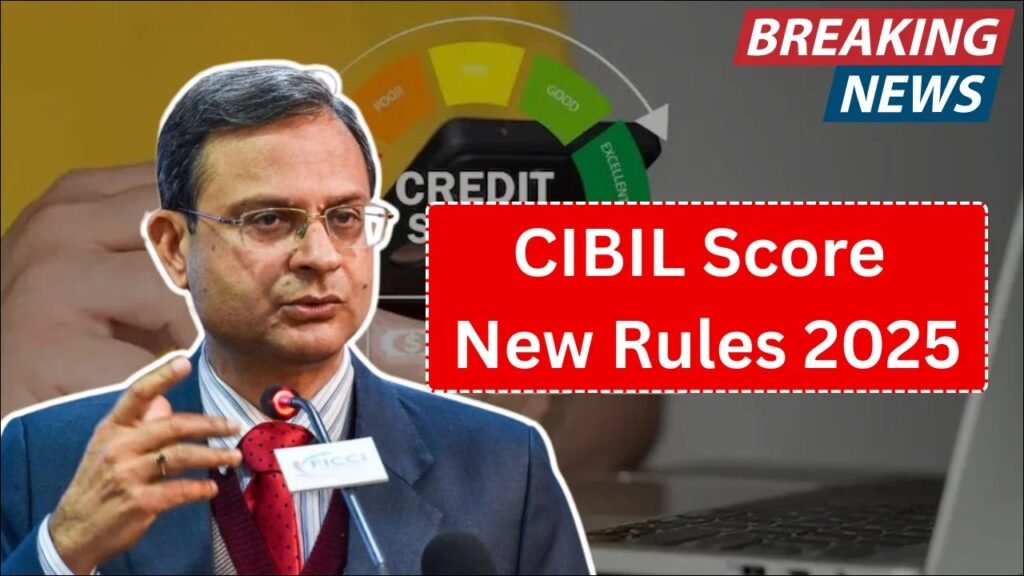
The year 2025 marks a groundbreaking shift in India’s credit scoring landscape with new CIBIL regulations that prioritize transparency, borrower protection, and faster processing. These comprehensive changes promise to revolutionize how credit information is managed, updated, and accessed across the financial sector.
The new regulations introduce several borrower-friendly measures that aim to create a more balanced relationship between lenders and borrowers while promoting fair credit practices throughout India’s financial system.
These changes address long-standing concerns about credit reporting delays, lack of transparency in loan rejections, and limited borrower rights in disputing credit report errors.
Table of Contents
Lightning-Fast Score Updates Every 15 Days
The most significant change eliminates monthly waiting periods for CIBIL score updates. Starting January 1, 2025, credit scores refresh every 15 days, ensuring borrowers see credit improvements and payment corrections reflected much faster in their profiles.
This accelerated timeline benefits borrowers who have recently corrected payment defaults or cleared outstanding dues. Banks now have access to more current information when evaluating loan applications, leading to fairer credit decisions.
The bi-weekly update cycle maintains superior accuracy and relevance in credit reporting, particularly helping borrowers actively working to improve their credit standing.
For consumers making efforts to improve their credit health, this means faster recognition of positive changes and quicker access to better loan terms and interest rates.
Mandatory Loan Rejection Explanations
Banks and financial institutions must now provide detailed explanations when rejecting loan applications based on low CIBIL scores. These comprehensive explanations are delivered via SMS or email within 48 hours of rejection.
This transparency initiative helps borrowers understand precisely why their applications were declined. Instead of receiving vague rejection letters, applicants get specific reasons related to their credit profiles.
The mandatory disclosure covers critical factors including payment history, credit utilization ratios, and outstanding dues. This detailed information enables borrowers to take targeted corrective measures before reapplying for credit.
The requirement ensures that borrowers are no longer left guessing about rejection reasons, empowering them to make informed decisions about improving their creditworthiness.
Protected 30-Day Error Correction Window
When credit report errors occur, borrowers receive a protected 30-day window to dispute and correct inaccuracies before loan processing continues. This safeguards against unfair decisions based on incorrect information.
Banks cannot finalize loan decisions during this dispute period if errors are formally challenged. This protection ensures fair treatment and prevents hasty rejections due to outdated or incorrect credit data.
The correction window prevents situations where borrowers face rejection due to reporting errors, giving them adequate time to resolve genuine inaccuracies with proper documentation.
This protection is particularly valuable for borrowers who discover errors during loan application processes and need time to coordinate with multiple lenders and credit bureaus.
Free Annual Credit Reports for Everyone
Every individual can now access one comprehensive CIBIL report annually at no cost through cibil.com. This initiative promotes financial awareness and helps borrowers monitor their credit health regularly.
The complimentary report includes detailed payment history, credit utilization patterns, and factors affecting credit scores. Regular monitoring helps identify potential issues before they impact creditworthiness.
Additional reports beyond the annual free access are available at standard charges, but the free report covers all essential information needed for effective credit monitoring.
This democratizes access to credit information, ensuring that financial status shouldn’t determine one’s ability to monitor their credit health.
CIBIL Score Impact Analysis
| Action | Score Range | Impact Level | Expected Outcome |
|---|---|---|---|
| Timely EMI Payments | 750-900 | Significantly Improves | Better loan terms, lower interest rates |
| High Credit Utilization (>50%) | 600-750 | May Lower Score | Higher rates, stricter terms |
| Missed Payments (Reported) | Below 600 | Severely Damages | Loan rejections, very high rates |
| Multiple Credit Inquiries | 650-750 | Temporary Reduction | Short-term impact, recovers in 6 months |
| Debt Settlement | 550-650 | Long-term Impact | Affects creditworthiness for 2-3 years |
| Credit Mix Optimization | 700-800 | Gradual Improvement | Better scoring over 12-18 months |
Proactive Default Alert System
Banks must send advance notifications via SMS or email before reporting missed payments to CIBIL. These alerts provide grace periods for borrowers to settle outstanding dues and avoid negative credit reporting.
The notification system includes payment due dates, outstanding amounts, and consequences of non-payment. This proactive approach helps prevent unintentional defaults that could damage credit scores.
Early warning systems enable borrowers to prioritize payments and maintain good credit standing, with alerts typically arriving 7-10 days before negative information reporting.
This system particularly benefits borrowers managing multiple EMIs who might occasionally overlook payment dates due to busy schedules or financial complexities.
Accelerated Dispute Resolution
Credit-related complaints must be resolved within 30 days, or banks face penalties of ₹100 per day for delays. This regulation ensures faster resolution of genuine disputes and creates accountability in credit reporting.
The time-bound resolution prevents prolonged uncertainty during loan applications. Borrowers can expect quicker responses to legitimate concerns about their credit reports.
Financial institutions now have strong incentives to maintain accurate records and respond promptly to borrower queries, improving overall service quality in the credit reporting ecosystem.
The penalty structure creates meaningful consequences for delays, ensuring that dispute resolution receives appropriate priority within banking operations.
Strategic Credit Management Tips
Maintaining a CIBIL score above 750 requires consistent financial discipline. Keep credit utilization below 30% of available limits and ensure all EMIs are paid punctually to maximize benefits from the new 15-day update cycle.
Diversify your credit mix with different loan types for positive score impact, but avoid applying for multiple credits simultaneously. Use the free annual report to track progress and set payment reminders to avoid accidental defaults.
Take advantage of the proactive alert system by ensuring your contact information is updated with all lenders. Respond promptly to default alerts to prevent negative reporting and protect your credit score.
Document all communications with banks and credit bureaus, especially during dispute processes, to ensure smooth resolution within the 30-day window.
Maximizing New Regulatory Benefits
The new regulations create opportunities for borrowers to actively manage and improve their credit profiles more effectively than ever before. Monitor your credit report quarterly using the free annual report and any additional reports you purchase.
Use the 15-day update cycle to track improvements after making payments or corrections. The error correction window provides valuable protection, so don’t hesitate to dispute genuine inaccuracies in your credit report.
These regulatory changes create a more balanced relationship between lenders and borrowers, promoting fair credit practices and improved transparency across India’s financial sector while empowering consumers with better tools for credit management.
Quick FAQs
Q:- How often will CIBIL scores update in 2025?
A = CIBIL scores will update every 15 days instead of monthly, starting January 1, 2025.
Q:- Will I get reasons for loan rejection?
A = Yes, banks must provide detailed rejection reasons via SMS or email within 48 hours of declining applications.
Q:- How long can I dispute credit report errors?
A = You have a protected 30-day window to dispute and correct credit report errors before loan decisions are finalized.





